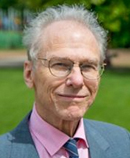
|
|
A journey to brain health At birth I suffered a brain injury. An EEG test showed chaotic, abnormal brain waves, and in school I had Attention Deficit Disorder (ADD). I couldn’t concentrate, and my thoughts were clouded. My grades were mediocre, and I flunked out of my first university. I wanted to become a writer, but my writing was disorganized and unclear. In despair, I took drugs, but they made my thoughts even foggier. Today my EEG shows normal, orderly brain waves with no sign of damage. I feel that my daily TM practice was a key component in recovering from my birth injury, and helped give me access to my talent and mental abilities. Without Transcendental Meditation, this change wouldn’t have occurred; I’m sure of that. Nourishing and synchronizing our brains How is this possible? Physiological studies show that during TM, our brain waves become more coherent, changing from the usual scattered, disordered patterns into synchronized waves flowing from back to front and coordinating across both hemispheres, an indication of more integrated mental functioning. The nourishing blood-flow to the brain increases. As a result, our whole brain becomes activated, enlivening more of our mental potential and enabling us to develop our talents. Melatonin and serotonin, neurotransmitters that promote well-being and relieve depression, increase. Arginine vasopressin, a hormone that regulates blood pressure and improves memory and learning ability, increases. The stress factors cortisol, adrenalin, blood lactate, and blood pressure decrease, indicating lessened anxiety. On the skin, electrical conductance decreases, a sign of relaxation, and we are also fully alert and aware of the surroundings. In this rejuvenating state of restful alertness, the physiology repairs itself and frees the system from accumulated stress. Comparison studies show that due to its effortlessness, TM achieves this state of restful alertness more effectively than other forms of meditation, as Dr. David Orme-Johnson, Dr. Fred Travis, and other researchers have found. TM also increases creativity, as I have experienced firsthand. Our mind is quieter and calmer, even outside of meditation, so we are able to hear the soft, inner whispers of creative ideas. And since TM is energizing, we are able to actualize them. TM as creative inspiration The direction these ideas take depends on our desires; they can enrich our art, our business, and our human relationships. Transcendental Meditation directly inspired three of my books. Summer Snow is a novel set in Central Asia, as an American warrior falls in love with a Sufi woman who persuades him to learn TM. He discovers that higher consciousness is more effective than violence, but his new insights get him into trouble with the army. The escalating violence threatens their future together and the lives of thousands. To save them, they use Vedic techniques designed to bring peace to the collective consciousness and end war. But can they make them work in time? Wellsprings: A Fable of Consciousness is set in 2026 as the earth’s ecosystem has broken down under human abuse. Water supplies are shrinking, crops withering, forests dying. In the midst of environmental and social collapse, an old woman and a young man set out to heal nature and reactivate the cycle of flow through Transcendental Meditation. But the corporations that control the remaining water lash out to stop them. Radical Peace: People Refusing War is narrative nonfiction about activists working for peace in unconventional ways. Noam Chomsky called it, “A book that captures such complexities and depths of human existence, even apart from the immediate message.” The concluding chapter presents the Maharishi Effect as the best way to create permanent peace. The best thing you can do for your brain For me, Attention Deficit Disorder is a thing of the past. Unfortunately, ADD [and ADHD] have now become a national epidemic, but TM is helping a new generation of students recover from it, through programs of the David Lynch Foundation. The scientific evidence is clear, and my life is living proof: Transcendental Meditation is the best thing you can do for your brain. ---------------------- About the author:
. © Copyright 2017 Global Good News®
|
|

